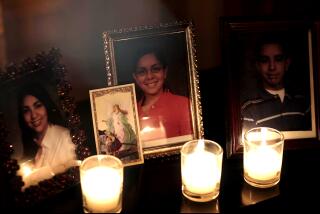An American Tragedy : She paid the price for speaking out.
In Lakewood, Gina Day is still scorned, still punished with the stings and stabs of contempt.
Four years ago, at age 16, she says, she was raped by a Spur Posse member. And then she did something unacceptable, something that marked her as a Bad Girl. She told.
The assault occurred, Day says, when her attacker invited her outside to talk after both attended a meeting at the same Catholic church where she had been baptized. The next day, she called the police from school. The young man was arrested but later released without ever being charged.
In time, seven other teenage girls would make similar allegations against other Spur Posse members.
Day, then a Lakewood High sophomore, was so devastated by the assault--and by the death of her father a month later--that she dropped out and enrolled in home study. It wasn’t until her senior year that she felt strong enough to return.
She anticipated some embarrassing comments and kidding. That was the price for speaking out. At a victims’ rights rally at a city park and later on the daytime talk show “Montel Williams” she railed against Spur Posse members for abusing girls with their sex-for-points contest.
But Day was not prepared for the unrelenting invective. “Spur Posse boys would take swings at me in the hall and say, ‘I’m going to kill you.’ They called me a bitch, a whore, a slut.
“I went home and cried and cried. Most days I was home from school at 10:30 in the morning. No one would help.”
Although Day says she repeatedly told school administrators what was going on, and repeatedly filled out forms naming her tormentors, the abuse continued.
Principal Mike Escalante, now assistant superintendent for business services for the Palos Verdes Peninsula Unified School District, declined to comment on the school’s handling of the incident.
So did his replacement, Jon Meyer. But the current principal did say he’s determined nothing like the Spur Posse case will happen under his watch. “If it does,” he says, “I deserve my head on a tray.”
Meyer adds that he is deeply concerned about society’s “incessant messages about sex, violence and alcohol.” And that he is sympathetic to young women. “Any time adolescents become sexually active, it’s the boys who do the bragging. The girls are the prey in our culture.”
No one knows that better than Day. Before the incident, she was a cheerleader, a color guard member and an honors student who had lived in the same tidy, tree-shaded neighborhood all her life. Afterward, she was an outcast. Even some of the girls she’d known since kindergarten joined in the hazing, she says.
“The girls turned on me because it made it easier. It was easier to blame me, to think, ‘She must have done something to have something so horrible happen to her.’ ”
Midway through her senior year, Day could no longer bear the daily debasement. She left school and finished her course work with home study and classes at Long Beach City College. Now 20 and four months pregnant with her first child, Day lives with her fiance in another city in Southern California. She sells real estate and works as a volunteer and a speaker at a center for abused women.
Reflecting on the many people she believes let her down--including her priest--Day reserves particular bitterness for school administrators. “They would call the boys in and say, ‘Now let’s all be mature enough to work this out.’ Mature! If someone is so immature as to do all this harassment in the first place, ‘working things out’ is never going to happen. There have to be rules.”
Meanwhile, the district attorney’s office declined to prosecute all but one of the boys initially arrested in the Spur Posse case.
Attorney Gloria Allred, who represented Day and five of the other girls who made the 1993 allegations, says the criminal justice system abandoned the young women. “The message is: Boys can continue to target girls with impunity.”
During trips back home, Day says she still runs into people at the grocery store or the mall who treat her with contempt. One of her younger brothers plays football at Lakewood High. She’d love to see a game, but can’t endure the punishing stares.
“It’s like hell for me there.”
More to Read
Sign up for Essential California
The most important California stories and recommendations in your inbox every morning.
You may occasionally receive promotional content from the Los Angeles Times.










